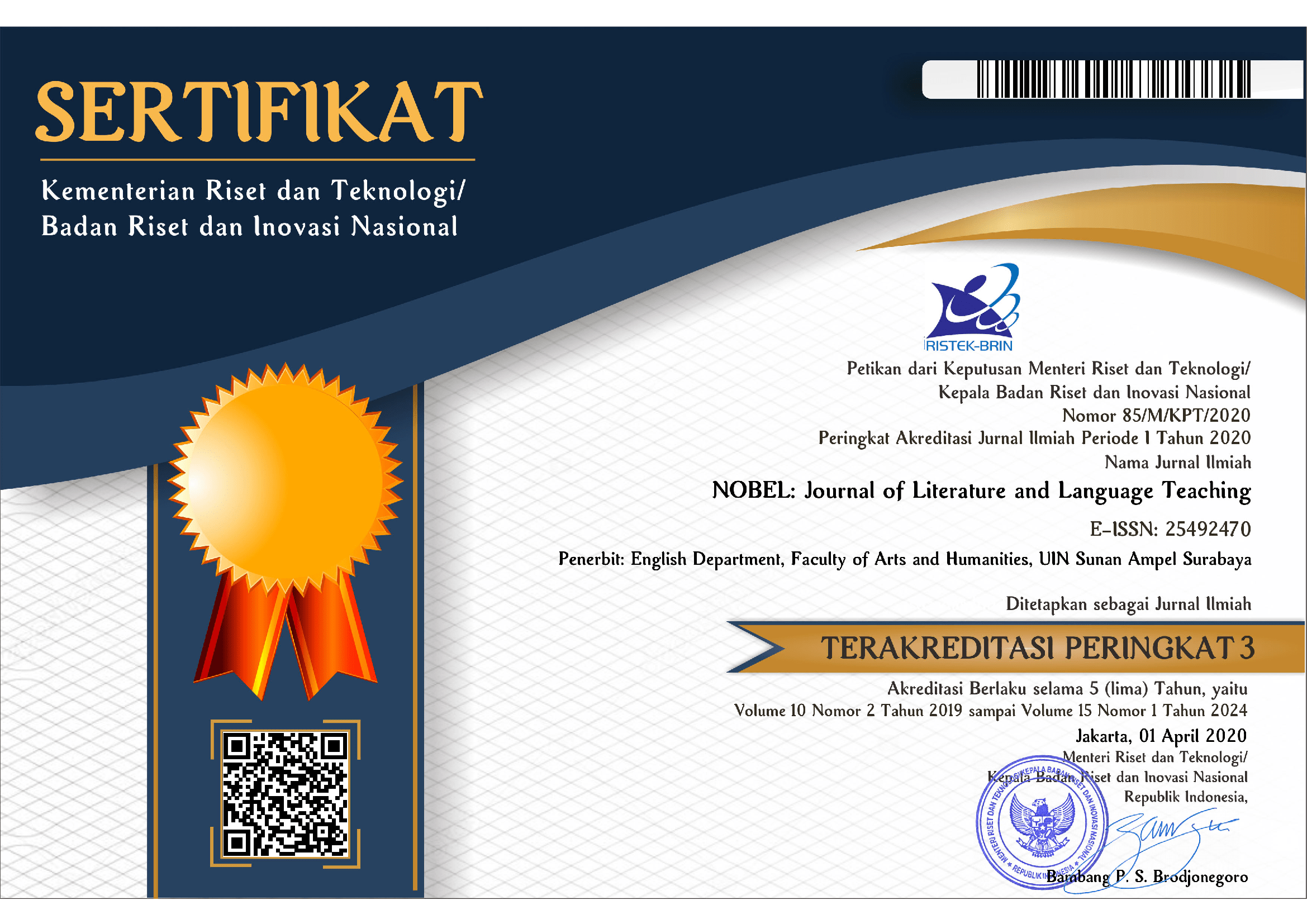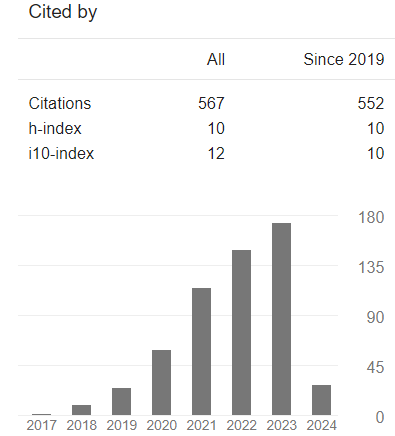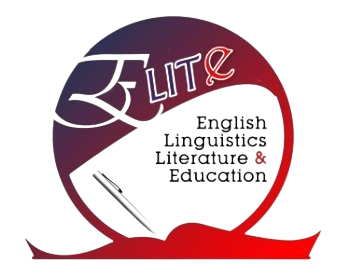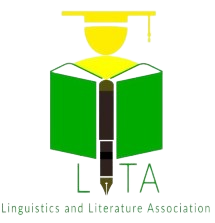Exploring English Language Teachers’ Technological Competence in Listening Skills Instruction
DOI:
https://doi.org/10.15642/NOBEL.2023.14.2.226-247Keywords:
ELT, listening instruction, technological knowledge, technological pedagogical knowledge, technological content knowledgeAbstract
The digitalized educational landscape of today requires ELT teachers to be conversant with technology. This study examined ELT teachers’ technological and pedagogical knowledge and their use of technology in listening skills instruction. To this end, an exploratory qualitative research design was employed. Thematic analysis was used to analyze the data collected using classroom observation and interviews. N-Vivo version 10 software was used for the data analysis. The findings indicated that teachers have a fair command of technology. However, they had limited technological content knowledge and technological pedagogical knowledge (TPK). Teachers were not able to make use of their knowledge of technology in their teaching. During listening instructions, only a few teachers use a smart board or a laptop to play audio materials. Most are not familiar with how to use any digital gadgets for teaching. For successful integration of digital technologies into listening instruction, training in the TPK is recommended. Furthermore, teachers’ capacity to use relevant digital apparatuses should be built.
Downloads
References
Akram, H., Yingxiu, Y., Al-Adwan, A. S., & Alkhalifah, A. (2021). Technology integration in higher education during COVID-19: An assessment of online teaching competencies through technological pedagogical content knowledge model. Frontiers in Psychology, 12(2021), 1–11. https://doi.org/10.3389/fpsyg.2021.736522
Aytan, T. (2016). The effect of a listening education course on the listening behaviors of prospective Turkish teachers. International Journal of Higher Education, 5(2), 254–262. https://doi.org/10.5430/ijhe.v5n2p254
Chai, C. S., Koh, J. H. L., & Tsai, C.-C. (2013). A review of technological pedagogical content knowledge. Educational Technology & Society, 16(2), 31–51. https://www.jstor.org/stable/jeductechsoci.16.2.31
Ertmer, P. A., & Ottenbreit-Leftwich, A. T. (2010). Teacher technology change: How knowledge, confidence, beliefs, and culture intersect. 42(3), 255–284. https://doi.org/10.1080/15391523.2010.10782551
Gao, P., Choy, D., Wong, A. F. L., & Wu, J. (2009). Developing a better understanding of technology based pedagogy. Australasian Journal of Educational Technology, 25(5), 714–730. https://doi.org/10.14742/AJET.1117
Graham, C. R. (2013). The role of technology in teaching and learning. In C. M. Reigeluth (Ed.), Instructional-design theories and models: An overview of their current status (4th ed., pp. 277–303). Taylor & Francis.
Hosseini, Z., & Kamal, A. (2012). Developing an instrument to measure perceived technology integration knowledge of teachers. International Conference on Advanced Information System, E-Education & Development ( ICAISED 2012 ), 1–14. http://www.icaised.com
Koehler, M. J., & Mishra, P. (2009). What is technological pedagogical content knowledge? Contemporary Issues in Technology and Teacher Education, 9(1), 60–70. http://www.tpck.org/.
Krashen, S. D. (1985). The Input Hypothesis. Longman.
Kukulska-Hulme, A., & Shield, L. (2014). Digital literacy for language learners: Principles and practices. Oxford University Press.
Levy, M., Hubbard, P., Stockwell, G., & Colpaert, J. (2015). Research challenges in CALL. Computer Assisted Language Learning, 28(1), 1–6. https://doi.org/10.1080/09588221.2014.987035/ASSET//CMS/ASSET/8981A9CD-7C27-4CEB-910C-D9157E2BBD9C/09588221.2014.987035.FP.PNG
Liu, S., Liu, H., Yu, Y., Li, Y., & Wen, T. (2014). TPACK: A new dimension to EFL teachers’ PCK. Journal of Education and Human Development, 3(2), 681–693. http://jehdnet.com/journals/jehd/Vol_3_No_2_June_2014/41.pdf
Milton, M., & Vozzo, L. (2013). Using new technologies to support the learning of Aboriginal pre-service teachers. In S. Goff (Ed.), From Theory To Practice, Context In Praxis: 8Th Action Learning, Action Research And 12Th Participatory Action Research, 2010 World Congress Proceedings (pp. 208–216). http://www.alara.net.au/wc2010/proceedings
Mishra, P., & Koehler, M. J. (2006). Technological pedagogical content knowledge: A framework for teacher knowledge. Teachers College Record: The Voice of Scholarship in Education, 108(6), 1017–1054.
Nehring, J. H., Charner-Laird, M., & Szczesiul, S. A. (2019). Redefining excellence: Teaching in transition, from test performance to 21st century skills. NASSP Bulletin, 103(1), 5–31. https://doi.org/10.1177/0192636519830772
Niess, M. L. (2011). Investigating TPACK: Knowledge growth in teaching with technology. Journal of Educational Computing Research, 44(3), 299–317. https://doi.org/10.2190/EC.44.3.C
Schmidt, D. A., Baran, E., Thompson, A. D., Mishra, P., Koehler, M. J., & Shin, T. S. (2009). Technological pedagogical content knowledge (TPACK): The development and validation of an assessment instrument for preservice teachers. Journal of Research on Technology in Education, 42(2), 123–149. www.iste.org.
Shulman, L. S. (1986). Those who understand: Knowledge growth in teaching. Educational Researcher, 15(2), 4–14. https://doi.org/10.3102/0013189X015002004
Warschauer, M. (2014). Technology and second language learning. In M. Celce-Murcia, D. M. Brinton, M. A. Snow, & H. T. Williams (Eds.), Teaching English as a second or foreign language (pp. 437–451). Pearson Education.
Yavuz, F., & Celik, O. (2017). The importance of listening in communication. Global Journal of Psychology Research: New Trends and Issues, 07(1), 8–11. https://doi.org/10.18844/gjpr.v7i1.2431
Zhang, M., & Chen, S. (2022). Modeling dichotomous technology use among university EFL teachers in China: The roles of TPACK, affective and evaluative attitudes towards technology. Cogent Education, 9(1), 1–24. https://doi.org/10.1080/2331186X.2021.2013396
Downloads
Published
How to Cite
Issue
Section
License
Copyright (c) 2023 NOBEL: Journal of Literature and Language Teaching

This work is licensed under a Creative Commons Attribution 4.0 International License.







